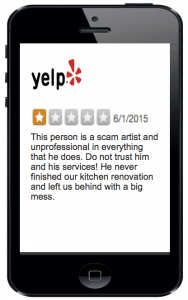How (NOT) to Respond to False Reviews
 After years of having great online reviews, suddenly a damaging, false and malicious review pops up in your search results. A negative review in itself is bad enough, but when the review is false and defaming it can get really frustrating. Instinctively, you might feel the urge to respond to false reviews on impulse, which is completely understandable.
After years of having great online reviews, suddenly a damaging, false and malicious review pops up in your search results. A negative review in itself is bad enough, but when the review is false and defaming it can get really frustrating. Instinctively, you might feel the urge to respond to false reviews on impulse, which is completely understandable.
But take a step back, and don’t let your emotions control your actions. Make sure to handle the situation prudently. There are a few things to take into consideration that will determine the best way to respond to the false review. Your reaction can help repair the damage, or make the situation worse.
Analyze the situation
It can be tempting to post an angry response to the false reviews in the heat of the moment, file a lawsuit or take revenge. However, you shouldn’t do anything until you’ve carefully analyzed the situation and worked out the consequences of the action(s) you plan to take.
Your approach should depend on 2 things:
- Is the review true or false?
- Who is it that posted the review? (consider teh source)
The most crucial thing is that you know who it is that posted the review and determine if it’s a legitimate customer with a genuine negative experience, or a malicious individual posting false statements to damage your reputation. Our director, Michael Roberts, is a Licensed Private Investigator and and has assisted many people with identifying their anonymous antagonists.
When not to respond to false reviews
 From a practical standpoint, the primary argument against responding or engaging with someone attacking your reputation is that it can rank higher in Google results if there is ongoing chatter appearing on the offending page. Also, responding will more often than not result in a “flame-war” with your antagonist.
From a practical standpoint, the primary argument against responding or engaging with someone attacking your reputation is that it can rank higher in Google results if there is ongoing chatter appearing on the offending page. Also, responding will more often than not result in a “flame-war” with your antagonist.
- Don’t respond to false reviews when dealing with a malicious antagonist
One of the most significant factors when considering a response to malicious allegations is whether or not your antagonist has a personality disorder. For example, facing off against an individual with antisocial personality disorder, or narcissistic personality disorder will, in many cases, bring social, emotional and financial debilitation to both you, your colleagues and your family. Sometimes it’s best to swallow your pride, let the sociopath think they’ve won, and quietly disengage while trying to get on with your life as best you can. An important part of this strategy is to quietly initiate search-engine-suppression (“SES”) efforts, under the radar, to mitigate the damage that is being caused by the malicious postings.
- Posting a rebuttal might cause higher ranking in Google search results
Responding to false reviews can actually make things worse by providing more content for search engines to index. In other words, your response could increase the google ranking of the search result. If you’d like to avoid this, try following Attorney Kenton J. Hutcherson’s advice: “..if you do post a rebuttal, avoid using any names or words that would give the search engines more keyword terms to find! Instead of saying something like “Smith’s Furniture…” try using “The company noted above…”.”
When it is a good idea to respond to the review?
Responding to negative reviews can help if removal is not possible. Mostly due to the fact that it allows you to share your side of the story and defend your business. When potential clients google your name and see the negative report, they will also see your rebuttal. Simply calling the review into question will make any fake review seem less trustworthy.
- When dealing with a legitimate review left by a customer who had a negative experience
When the negative review is a genuine experience from a legitimate customer, try to solve the issues. Your response is the most direct and immediate way of sending the message to the world that if a bad experience happened, you would want to set things straight.
- When removal is not possible
When removal or suppression is not working, take control and defend your business from damaging effects from the fake reviews. By responding appropriately, and through the right channels, you are able to tell your side of the story and undermine the trustworthiness of the negative review simply by calling its credibility into question.
Yelp
Yelp is a special case when it comes to reviews. When dealing with Yelp we recommend to wait at least 10 days before you reply to the review. This is because Yelp filters reviews through their algorithm. If the review is posted by someone who hardly posted reviews on Yelp before, it is very likely the review will be pushed down due to other reviews. Yelp’s filter causes Yelp to rank regular reviewers higher than fairly new reviewers. If you respond to the review too soon, it might cause that specific review to stick even more. So, be patient and decide whether or not responding is necessary.
How to respond to false reviews
 When posting a rebuttal, strategically and carefully wording your reply is critical. It should be noted that while your message itself is import, the tone of your reply should not be undervalued. Below, you’ll see a few tips you can use to formulate a reply.
When posting a rebuttal, strategically and carefully wording your reply is critical. It should be noted that while your message itself is import, the tone of your reply should not be undervalued. Below, you’ll see a few tips you can use to formulate a reply.
- Ask them to contact you directly to resolve whatever problem they have
- Respond in a way that clears things up for a third party
- Be helpful and avoid being argumentative
- If review is fake: make it clear that you don’t have a record of the reviewer as a user of the product
Posting a rebuttal through other high ranking platforms
When you respond to false reviews, the rebuttal will appear beneath the original report and strengthen the ranking of the negative result. Additionally, your rebuttal will not change the damaging language that appears in Google’s search results. Your potential clients won’t see your rebuttal until they have actually clicked on the negative search result for a more in-depth look at the negative review.
If you must respond, try doing so on a different, trustworthy platform that ranks well in Google. This is generally a more safe and effective option. This balances criticism, and mitigates, or altogether prevents, flame-wars. One example of such a platform would be OfficialResponse.org.
Need help with your rebuttal? Please Contact page1.me Team and of our experts will be in touch shortly.
 Page1.me
Page1.me